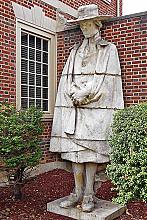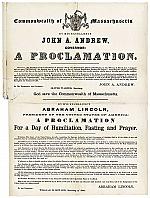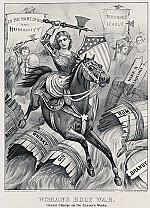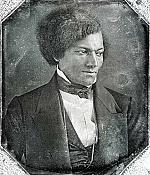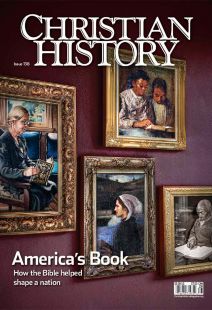Blessings and curses
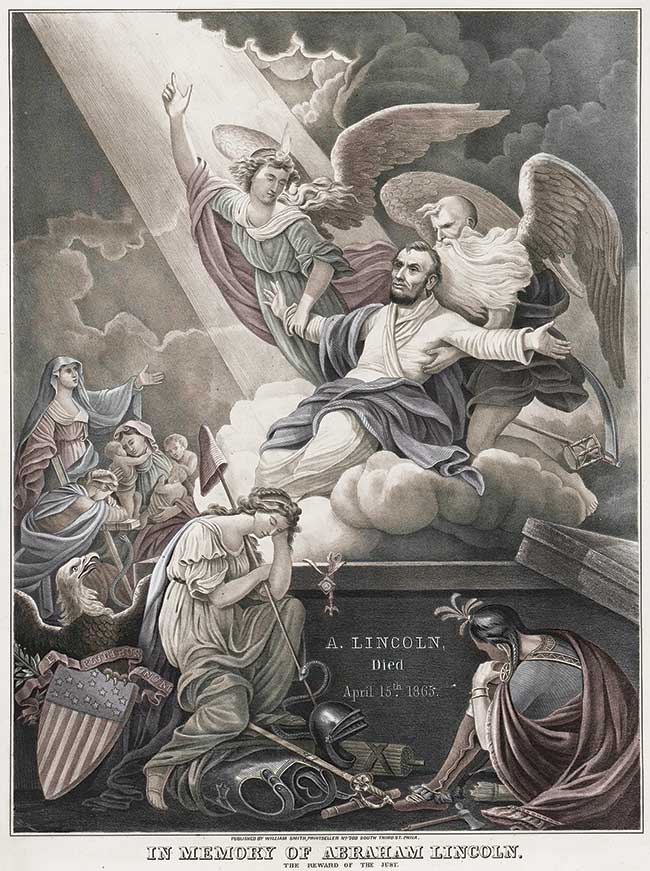
[D. T. Wiest. In Memory of Abraham Lincoln: The Reward of the Just. 1865. Newberry Library / [Public domain] Wikimedia]
For we must consider that we shall be as a city upon a hill [Matthew 5:14]. The eyes of all people are upon us. So that if we shall deal falsely with our God in this work we have undertaken, and so cause Him to withdraw His present help from us, we shall be made a story and a by-word through the world.—Roger Winthrop, “A Model of Christian Charity” (1630)
It was fashionable, hundreds of years ago, for the children of Jacob to boast, we have “Abraham [as] our father,” when they had long lost Abraham’s faith and spirit [Matthew 3:9, John 8:38–39]. That people contented themselves under the shadow of Abraham’s great name, while they repudiated the deeds which made his name great. Need I remind you that a similar thing is being done all over this country today?—Frederick Douglass, “What to the Slave Is the Fourth of July?” (1852)
Fondly do we hope, fervently do we pray, that this mighty scourge of war may speedily pass away. Yet, if God wills that it continue until all the wealth piled by the bondsman’s two hundred and fifty years of unrequited toil shall be sunk, and until every drop of blood drawn with the lash shall be paid by another drawn with the sword, as was said three thousand years ago, so still it must be said “the judgments of the Lord are true and righteous altogether” [Psalm 19:9].—Abraham Lincoln, “Second Inaugural Address” (1865)
Having behind us the commercial interests and the laboring interests and all the toiling masses, we shall answer their demands for a gold standard by saying to them, you shall not press down upon the brow of labor this crown of thorns [Matthew 27:29]. You shall not crucify mankind upon a cross of gold.—William Jennings Bryan, “Cross of Gold” (1896)
America was born a Christian nation. America was born to exemplify that devotion to the elements of righteousness which are derived from the revelations of Holy Scripture. . . . I ask of every man and woman in this audience that from this night on they will realize that part of the destiny of America lies in their daily perusal of this great book of revelations—that if they would see America free and pure they will make their own spirits free and pure by this baptism of the Holy Scripture.—Woodrow Wilson, “The Bible and Progress” (1911), celebrating the 300th anniversary of the KJV
I just want to do God’s will. And He’s allowed me to go up to the mountain. And I’ve looked over, and I’ve seen the Promised Land [Deuteronomy 34:1–4]. I may not get there with you. But I want you to know tonight, that we, as a people, will get to the Promised Land.—Martin Luther King Jr., address at Bishop Charles Mason Temple (1968) the day before he was assassinated
By Alan R. Crippen II
[Christian History originally published this article in Christian History Issue #138 in 2021]
These speeches were selected by Alan R. Crippen II, executive director, Faith and Liberty Initiative, American Bible Society. Specific excerpts were chosen by CH editors.Next articles
Preaching the holy war (Bible in America)
Both sides in the civil war appealed to the Bible
James H. MoorheadChristian History timeline: Haunted by the word
Americans have translated, interpreted, applied, and wrestled with the Bible from colonial times to the 21st century
the editors



